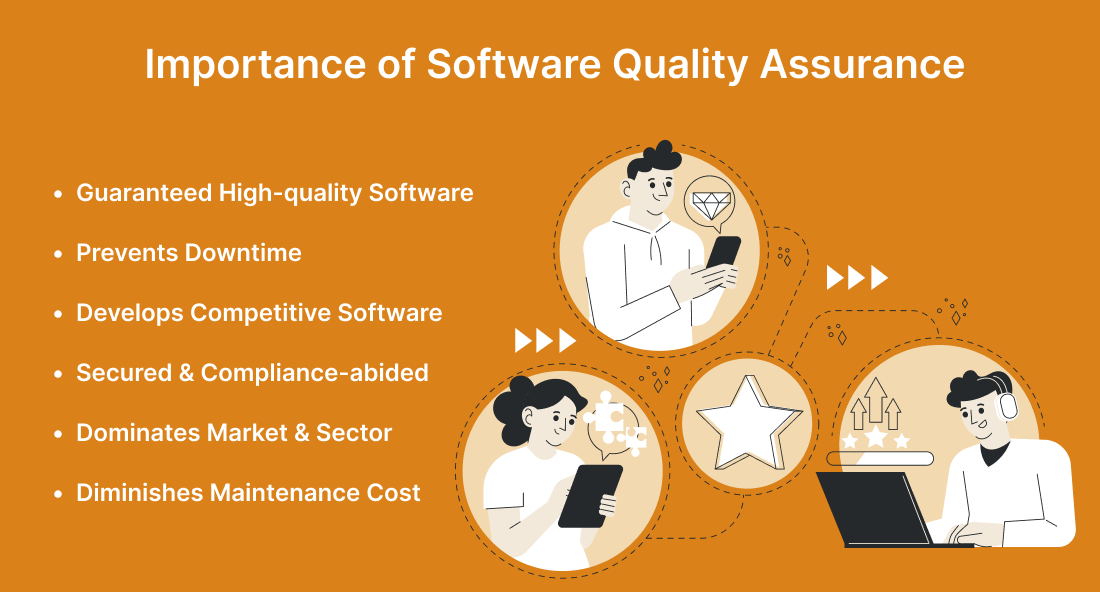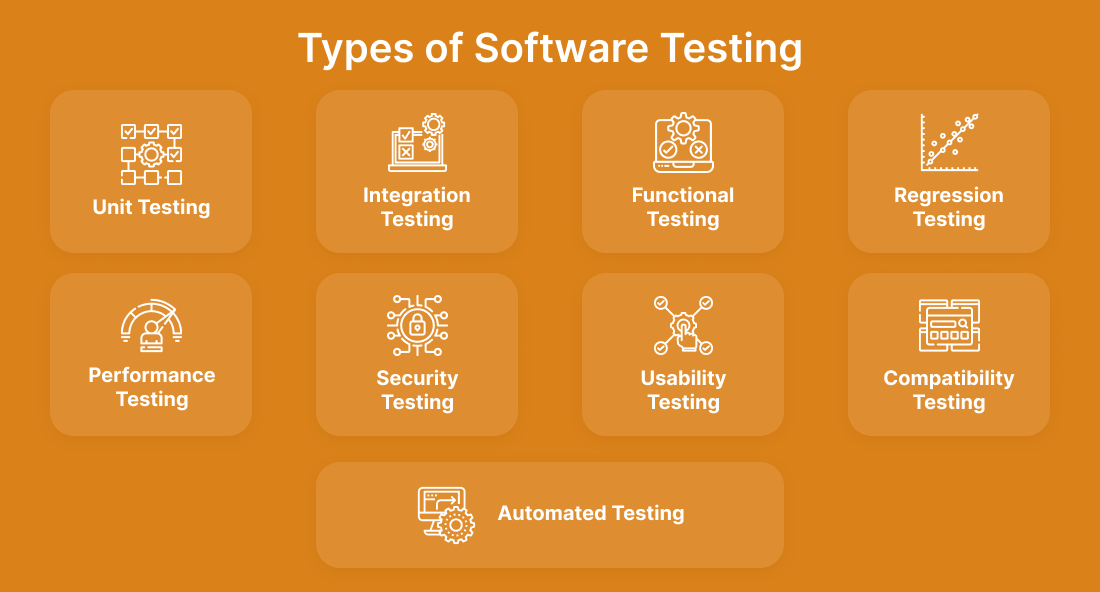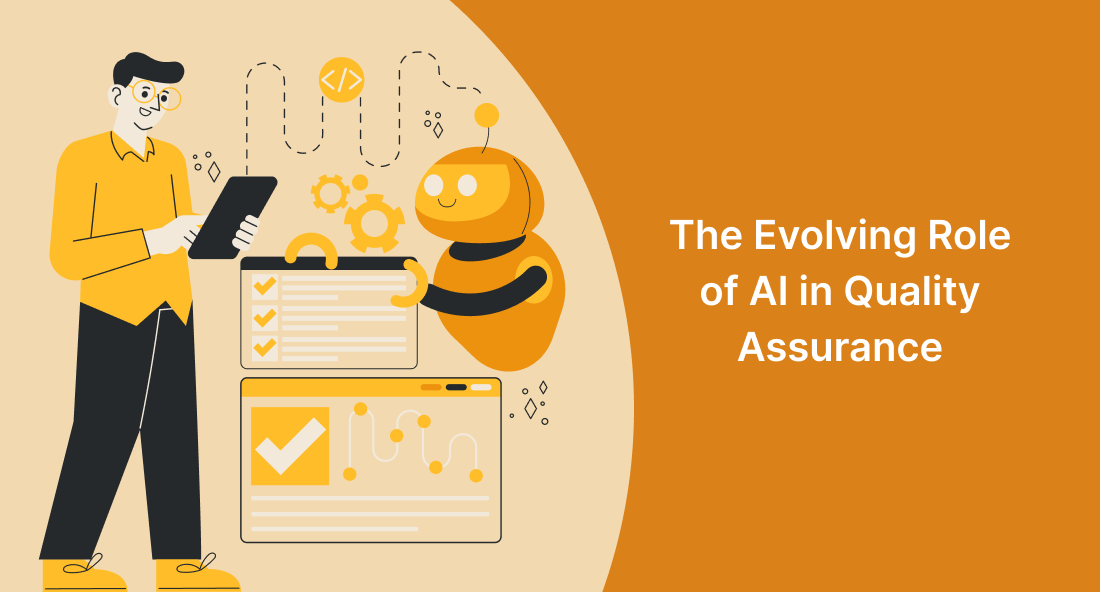Quick Summary:
Witness the true potential of Software Quality Assurance in Action! From coding to user satisfaction, we ensure the delivery of flawless software. Your dream of an error-free and revenue-generating digital platform is just a blog away. Read this blog to know the importance of Software Quality Assurance. And don’t forget to read how Artificial Intelligence dominates the testing phase.
Table of Contents
Introduction
“A single hole can sink an entire ship.”
The idiom is much more relatable to this blog on the importance of software quality assurance. Like a single hole, a single flaw in your software can make you lose a chunk of potential traffic.
And the biggest real-life examples are Netflix, Amazon, Spotify, and LinkedIn because they have noticed massive reductions in traffic due to a single bug. Below are some stats:
- Amazon noticed a 30% reduction in traffic in 2013 due to a software bug, disallowing customers from accessing the website.
- Netflix reported half of the traffic reduction in 2016 due to a software bug.
- LinkedIn experienced a 70% reduction in traffic because of a bug disallowing users to log in.
- Spotify, an audio streaming and media service provider, also lost massive traffic due to software bugs.
But what made these big fishes come back and dominate their industry? It was timely assuring the quality of their software and performing rigorous testing.
Now that you know why rectifying even a single bug is important, this blog will introduce you to all the essentials of quality assurance.
What is Software Quality Assurance (SQA)?
Software Quality Assurance is the parallel process to the software development life cycle. It assures that the software product is ready to release for public use when fully developed. The SQA process begins while starting the software development and continues till the release. Quality assurance is an ongoing process of testing the software on different quality standards to improve software quality.
The objective of the SQA is to detect all the bugs and errors before the software release and rectify them so that the end product becomes flawless.
Software Quality Assurance has four basic principles, which include:
1. Preventing Defects
The primary principle of Software QA is to detect defects in the software product in the development stages. Detecting and rectifying bugs proactively will reduce technical debt and save you from the traffic reduction threat. And opting for SQA will help you win customers’ heart because it not only fixes symptoms but also identifies and eliminates the root cause of bugs.
2. Continuous Improvement
Software is developed once, but new features are always added, which might create a bug; this demands continuous attention. When implementing corrective, functional, or recommended updates or indulging in code refactoring to enhance software functionality, it becomes imperative to re-test. Due to this, continuous improvement becomes one of the core principles of Software QA.
3. Stakeholders Contribution
Collaborating with all stakeholders, including clients, developers, testers, the QA team, and the project lead, keeps everyone on the same page. It makes software development and rectifying flaws process easier and swifter.
4. Risk-based Approach
Lastly, Software Quality Assurance ensures identifying and highlighting the potential risks associated with the software product. This way, SQA can rectify those bugs that could hamper your software product.
Importance of Software Quality Assurance for Your Business
Not only is rectifying bugs important, but several other benefits make Software QA worth spending. Keep reading the software quality assurance importance to understand why you must invest in it.

Guaranteed High-quality Software
Once the software undergoes quality assurance, it becomes reliable, user-friendly, and highly efficient. The process ensures that the software abides by quality standards and requirements.
Prevents Downtime
Nothing could be more catastrophic than your software failing to meet its target audience’s demand. Another potential importance of software quality assurance is the prevention of downtime because reviving it once it has stopped functioning could require more investment than before, but if the software has undergone quality assurance, software failure will be a thing of the past.
Seamless Code Symphony, Flawless User Experience
Unlock endless software possibilities with quality-driven software product development services and QA expertise
Develops Competitive Software
Software released without testing will have failures, like disallowing users from accessing or crashing while accessing it. But with Software Quality Assurance and performing granular testing, you can be assured that your software is reliable, usable, portable, and functional.
Secured & Compliance-abided
Software Quality Assurance ensures efficient, trustworthy, and secure software that meets industry standards like data privacy and security. There are several compliances like HIPPA, GDPR, and regulatory compliance.
Dominates Market & Sector
A high-quality software that remains intact no matter how many users access it, doesn’t crash in any environment, and caters to the requirement makes a dominant position in the market.
Diminishes Maintenance Cost
With Software Quality Assurance, you do not need to wait for users facing issues and then rectify them. It automatically gets detected during the development phase and rectified then. This means no long-term, hefty maintenance cost.
What are Different Types of Software Testing for Quality Assurance?
Now you know the importance of software quality assurance but do you know the success of Software Quality Assurance depends on how testing has been performed? Well, it does! But it is also important to consider which testing is essential for your product or particular functionality.

Unit Testing
It is a type of testing that undertakes a single code and tests it meticulously to see if everything works as expected. Such testing assures flawless functioning of the task for which the code is written and tested. Most skilled software QA testers perform unit testing and then only advocate for that functionality to be flawless.
Integration Testing
Another testing type followed by unit testing is Integration. It tests how two different units or functions work together and if there are any performance glitches. Integration testing aims to notice any faults when two or more functions interact.
Functional Testing
When the software passes the functional testing phase, it is said to be ready for public use. The reason is; the software’s functions are marked to deliver the desired outcomes as users expect. This is necessary testing because your users will be satisfied if the product meets their expectations.
Regression Testing
This testing type is also said to double-check what was previously done and see whether it works as expected. For instance, a codebase is tested, and a new feature is introduced for which fresh code is written. When testing the new code, the already tested code is re-tested to see any bugs pop up.
It is a type of testing that measures the speed, responsiveness, and stability of a device or software product under a certain workload. This will help identify the bottlenecks related to performance.
Security Testing
One of the crucial and must-needed testing for business owners is security testing. This unveils security vulnerabilities, threats, and loopholes in your software application. Besides, running security tests even helps prevent malicious attacks. As a business owner, it’s important to partner with a company that specializes in security testing, and if needed, you should hire software developers with expertise in this area.
Usability Testing
Another great testing type that most business owners should consider is usability testing. Such testing undertakes the actual use of software products to see whether the functions work as expected. There will be two parties; one using the product and the other taking notes of the software behavior.
Compatibility Testing
A business owner would be happy if their software product works swiftly across databases, devices, operating systems, networks, and hardware. Besides, compatibility testing is all about ensuring that the software product works as expected in varied hardware & network setups. A software product’s success depends on how your software is compatible with meeting and growing demands of its users.
Automated Testing
This is the only software testing that executes without manual intervention. It ensures all the functionalities perform well before the software is made live for public use. By leveraging different automated testing practices, you get faster feedback on failures. Aligning with the “Fail Fast, Fail Early” principle, it allows you to achieve software quality that is unmatched by other testing types.
Software Quality Assurance in Hybrid vs Waterfall vs Agile Methodologies
There are three software development life cycles with different testing measures. Let us share how different life cycles test software and which is beneficial for your software.
| Aspects |
Hybrid |
Waterfall |
Agile |
| Development Approach |
Combination of Waterfall and Agile |
Sequential approach with multiple phases |
Iterative & incremental approach |
| Testing Integration |
Testing and development phases are integrated |
Testing at the end of development |
Continuous testing to eliminate the root cause of bugs |
| Testing Phases |
Several testing phases |
Dedicated testing phase post software development |
Testing in short durations |
| Risk Management |
Detects & prevents risk |
Risk analysis before development |
Constantly analyzes to eliminate risks |
| Feedback |
Reviewing post development |
Reviewing post development |
Continuous feedback and addressing of issues |
| Customer Involvement |
Can be included |
Little to no room for iterations |
Involving clients for continuous improvement |
Quality Architects at Your Service
Hire dedicated software development team to meticulously sculpt and fortify your code, resulting in digital platforms that give a competitive edge.
The Evolving Role of AI in Software Quality Assurance
Although manual testing doesn’t eliminate 100% of the software’s bugs and flaws, it is still the only option to leverage and make the software available for public use. But in the evolving tech landscape, we have Artificial Intelligence, replacing humans not entirely but to the extent that can guarantee flawless software delivery.

What benefits can you expect from AI in Quality Assurance?
Here is a list of benefits of Artificial Intelligence in Quality Assurance you can enjoy:
- Reduce testing time by 60%, eliminating duplicate tests and performing regression and smoke tests.
- AI even suggests what type of tests must be performed on a specific functionality based on risk detection using ML algorithms.
- AI also evaluates the application’s requirements in the market, based on which it offers vulnerabilities in business operations.
- AI evaluates production data and experiences, guiding the QA team to perform rigorous testing for issues.
- AI compares your application with the already existing apps in the market to understand their success and offer you suggestions.
- To eliminate breakdown, AI suggests new test cases to be performed so that there would be no downtime.
Conclusion
In short, understanding the importance of Software Quality Assurance plays a significant role in software development and deployment. It assures that your software product meets quality standards. Since SQA is one of the pillars of successful SDLC, it involves continuous improvement & monitoring so that it can detect and prevent bugs and errors on time. Having a product passed through software QA means the application is ready for public use.
You can partner with a dedicated software development company if you have software or want to develop one. The team is well-versed and knows the software quality assurance importance, meaning you can rest assured about the swift performance of your software.
Frequently Asked Questions (FAQs)
It studies a given software product to evaluate its defects and quality attributes. If you maintain software quality, you will not have to worry about security issues or threats.
The importance of quality assurance in software development includes high-quality and glitch-free software. It makes your software trustworthy, productive, and user-friendly. If no rigorous testing is important software quality assurance in software engineering performed, there are high chances of software bugs and failure.
Software quality characteristics are maintainability, reliability, reusability, portability, accuracy, and effectiveness.
Here is the list of principles of software testing:
- Testing helps to identify bottlenecks
- Impossible exhaustive testing
- Proactive testing delivers desired outcomes
- No clustering of defects
- Never run the same software test again







